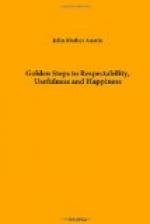or regulating the religious conduct of the multitude;
the indifference and submission with which the religion
of the state is generally received by the common people;
the caprice and vehemence with which it is sometimes
opposed; the frenzy with which men have been brought
to contend for opinions and ceremonies, of which they
knew neither the proof, the meaning, nor the original:
lastly, the equal and undoubting confidence with which
we hear the doctrines of Christ or of Confucius, the
law of Moses or of Mahomet, the Bible, the Koran,
or the Shaster, maintained or anathematized, taught
or abjured, revered or derided, according as we live
on this or on that side of a river; keep within or
step over the boundaries of a state; or even in the
same country, and by the same people, so often as the
event of a battle, or the issue of a negotiation, delivers
them to the dominion of a new master;—points,
we say, of this sort are exhibited to the public attention,
as so many arguments against the
truth of the
Christian religion;—and with success.
For these topics being brought together, and set off
with some aggravation of circumstances, and with a
vivacity of style and description familiar enough
to the writings and conversation of free-thinkers,
insensibly lead the imagination into a habit of classing
Christianity with the delusions that have taken possession,
by turns, of the public belief; and of regarding it
as, what the scoffers of our faith represent it to
be,
the superstition of the day. But is
this to deal honestly by the subject, or with the
world? May not the same things be said, may not
the same prejudices be excited by these representations,
whether Christianity be true or false, or by whatever
proofs its truth be attested? May not truth as
well as falsehood be taken upon credit? May not
a religion be founded upon evidence accessible and
satisfactory to every mind competent to the inquiry,
which yet, by the greatest part of its professors,
is received upon authority?
“But if the matter of these objections
be reprehensible, as calculated to produce an effect
upon the reader beyond what their real weight and
place in the argument deserve, still more shall we
discover of management and disingenuousness in the
form under which they are dispersed among the
public. Infidelity is served up in every shape
that is likely to allure, surprise, or beguile the
imagination; in a fable, a tale, a novel, a poem; in
interspersed and broken hints, remote and oblique
surmises; in books of travels, of philosophy, of natural
history; in a word, in any form rather than the right
one, that of a professed and regular disquisition.
And because the coarse buffoonery and broad laugh of
the old and rude adversaries of the Christian faith
would offend the taste, perhaps, rather than the virtue,
of this cultivated age, a graver irony, a more skilful
and delicate banter is substituted in its place.
An eloquent historian, beside his more direct, and




